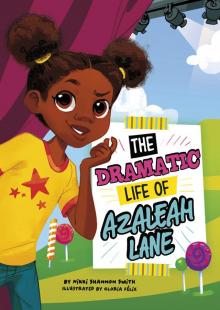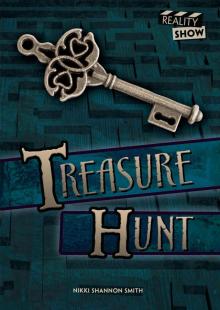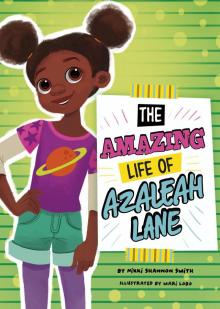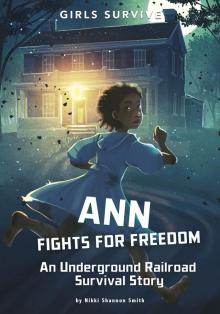- Home
- Nikki Shannon Smith
Ann Fights for Freedom
Ann Fights for Freedom Read online
TABLE OF CONTENTS
Cover
Half Title Page
Title Page
Chapter One
Chapter Two
Chapter Three
Chapter Four
Chapter Five
Chapter Six
Chapter Seven
Chapter Eight
Chapter Nine
Chapter Ten
A Note From The Author
Making Connections
Glossary
About the Author
Copyright
Back Cover
CHAPTER ONE
Eastern Maryland
Wednesday, November 15, 1854
Sundown
Ann shivered. The cold was everywhere. The dirt floor of her family’s one-room cabin was almost as cold as the November air. Earlier the sun and hard work in the field had kept her warm, but now Ann had to move closer to the cook fire. It didn’t help. She would have to wait for the fire’s warmth to fill the cabin.
“Ann, don’t get too close, now,” said Mama.
Ann pulled her feet back just enough to put Mama at ease.
Mama was a strong woman who always said her children were the most important thing in the world. She said no matter what Master Adam thought, they were her children, not his. Just because they were slaves didn’t mean he owned their hearts or their souls.
Daddy always said Mama had a fire burning inside and that it was where she got her strength. But the fire inside Mama was burning out. It had started two months ago when Granny died. Mama barely ever smiled now, and she never hummed while she cooked anymore. Losing her mama had broken her heart.
Ann missed the old Mama even more than she missed Granny. If she had one wish, she’d bring Granny back to them. That way Mama would come back too.
Daddy sat down on the ground next to Ann and let out a groan, the same way he did every night. His back was tired. Their family had spent all day pulling dried cornstalks from the hardened soil in the field.
Paul sat down where he didn’t fit—right between Ann and Daddy. He was only five, and he couldn’t stand to be more than three feet from somebody. He was scared of everything too. Maybe that’s why he couldn’t let himself be alone.
“Ann,” said Mama, “hold the baby.” Mama handed baby Elizabeth to Ann. As soon as she did, Elizabeth started to cry.
“She doesn’t like me,” said Ann.
Daddy laughed. “She doesn’t like anyone but Paul and your Mama.”
Mama sighed and said, “She misses Granny.”
Elizabeth had been born during the last apple harvest, in early fall. She was twelve years younger than Ann. Two weeks later, Granny had died from an infection.
When Daddy came into the cabin the day after Granny died, he had found the baby screaming in one corner and Mama crying in the other. Ann hadn’t known what to do so she’d sat by the fire with Paul and stayed out of the way.
Daddy had gotten Mama and Elizabeth calmed down and asked Ann to come outside to the garden with him. He had looked at Ann with a serious face.
“Ann,” he’d said, “do you remember what Granny always called you?”
Ann had nodded. “She called me an old soul.”
“Granny was convinced you’d been here before,” Daddy had told her.
Granny had always said things that didn’t make sense to Ann. “What does that mean, Daddy?” Ann had asked.
Daddy had chuckled and put his hand on her shoulder. “It means you’re an old lady in a little girl’s body.”
Ann liked the idea of being like a grown-up, but not the idea of being an old lady. She had tried to figure out why Granny thought that, but Daddy had interrupted her thinking.
“You’re going to have to be grown-up and help your mama,” Daddy had said.
Ann had nodded again and followed Daddy back inside—and she had spent the last month or so trying as hard as she could to keep her promise to Daddy. If Mama needed help, Ann would help her.
So Ann held the baby, even though it was her least favorite job. It was a job nobody could do right, and Ann liked to do things right.
Elizabeth squirmed and hollered. “Shhh,” said Ann. She bounced Elizabeth a little bit, like Mama did, but it didn’t work.
Finally dinner was ready. Mama gave everyone a strip of pork and a piece of ashcake. Then she took the baby back from Ann and sat down.
Dinner in their cabin was almost always quiet. By the end of the day, Daddy was too tired, Mama was too sad, and Ann was too hungry to talk. Paul always had something to say, but someone usually shushed him.
Ann stared off while she chewed on her ashcake. She loved the way the sweet cornmeal taste broke through the ashes from the fire that covered it. Something in the corner of the cabin caught her eye—a spider!
Daddy said Ann was as brave and steady as any grown man he’d ever known, but she was afraid of spiders. “Daddy,” she whispered. “A spider.”
Daddy sighed. “Where?”
“Over there!” said Paul. “I see it.”
Paul was trying to act like he was being helpful, but Ann knew better. He wanted Daddy to get the spider just as badly as Ann did. Paul didn’t like anything that crawled. During tomato season, he had to pick the worms off the crops, and he cried the whole time he did it.
The only reason he did it at all was because he was more afraid of the overseer than the worms. The overseer watched the slaves’ every move while they worked in the fields, and he was mean.
When Paul had turned four and was big enough to help in the fields, he had seen the overseer whip Daddy. There was a lot to be afraid of on this farm, and bugs were the least of them. Sometimes Ann heard the older slaves talk about running away from Maryland. They said up north they could be free.
“Get it!” yelled Paul. He pointed at the spider.
“Shhh,” said Mama.
Daddy groaned again as he got up. He walked over and squished the spider. “I don’t know how you get through a day’s work,” he said. “Nothing but bugs in the fields.”
Ann didn’t answer. Outside she did what she had to do. Inside she felt safer. Inside she could ask Daddy to get a spider. Inside she could be a child.
After dinner Ann and Paul got into their sleeping spots. They slept on the ground on a small bed of hay. They lay halfway between the wall and the fire. Mama didn’t want them to get burned, and they didn’t want to be next to the cold cabin walls. The walls were made of logs, and the evening chill snuck in through the spaces.
Paul always scooted closer to Ann before he fell asleep. Sometimes she rolled away. Tonight his warmth felt good, so she let him stay close.
Paul started snoring about three minutes later. Mama sat up and nursed the baby, while Papa rubbed his feet and stared at the fire.
Ann always fell asleep watching her parents. She liked for them to be the last thing she saw every night and the first thing she saw every morning. She knew a lot of slave owners sold people away from their families. She never forgot to be grateful that hadn’t happened to hers. Her eyelids began to feel heavy.
Just then, Ann thought she heard somebody whisper her daddy’s name: “John.”
Mama said, “Did you hear that?”
The voice came again, from outside the cabin. “John. You awake?”
Ann was wide awake again. No one ever came by this late. All the slaves turned in early, because they were all afraid to oversleep. If they weren’t in the field at sunrise, they might be beaten.
/> Daddy got up and disappeared through the door. Ann heard whispers outside, but she couldn’t hear the words. She looked at Mama’s worried face and had a feeling her own face looked just as worried.
When Daddy came back in, his face drooped.
“John, what is it?” asked Mama.
Daddy squatted down and put his arm around Mama. He didn’t answer her. Instead he stared at the baby. A single tear rolled down his cheek.
Mama stood up and faced him. “What?” she asked again.
Daddy looked at where Ann and Paul slept. Ann shut her eyes, so he’d think she was asleep too.
“Bad news,” said Daddy.
Ann’s heart sped up. She hoped nobody had died. She was just getting used to life without Granny. Ann held her breath so she could hear Daddy better.
“Daniel said that Sarah overheard Master Adam talking in the big house,” said Daddy.
Ann liked Daniel a lot. He was Daddy’s best friend. He lived in the cabin next door and his wife, Sarah, cooked for Master Adam’s family.
“What did he say?” asked Mama.
“He’s come on hard times. Money’s short,” said Daddy.
Mama started to cry. Ann didn’t understand why Mama was this upset about Master Adam’s money. The silence went on so long Ann opened one eye to see what her parents were doing. Daddy had his arms around Mama. Elizabeth was in between them, fast asleep.
“Who?” asked Mama.
To Ann, it seemed like a strange thing to ask. Did somebody take Master Adam’s money? Maybe Mama and Daddy were worried one of them would be blamed.
Daddy whispered, “Ann and Paul.”
Mama crumbled to the ground. Daddy caught the sleeping baby as she fell. Mama’s whole body shook. “Not my babies,” she said. “Not my babies.”
Us? thought Ann. We don’t even know where Master Adam keeps his money.
Ann watched her parents through one eye. Daddy got down next to Mama and rubbed her shoulder. Mama jerked up onto her knees. She put her face so close to Daddy’s, Ann thought they were going to kiss.
“You have to do something. You can’t let him sell my children,” said Mama.
CHAPTER TWO
Eastern Maryland
Wednesday, November 15, 1854
Late night
Ann’s eyes popped open. She strained to hear her parents’ voices over the thundering sound of her own heartbeat. Master Adam had never sold anyone away.
Why is he picking us? Ann wondered.
She thought if you did what you were told and worked hard, you could stay with your family. She thought slaves got sold when they caused trouble. Daddy had taught her to follow the rules. He said it would keep her safe, and she had believed him.
Anger and fear rose in Ann’s body until her cheeks felt hot. She struggled to stay still. She wanted to interrupt, but she also wanted to hear the rest of what they had to say.
“There’s nothing I can do,” said Daddy.
Mama’s face twisted with sadness and rage. “You can’t let him sell the children. He picked them just because they’re small and can’t do as much work.”
“Maybe he’ll sell me instead,” said Daddy. “I’ll ask tomorrow.”
Ann didn’t want Daddy sold either. None of them could be sold. Ann always listened to the old people when they talked. She knew about places much worse than here. Places in the South. Families who were separated never saw each other again. None of them could end up somewhere like that.
“No,” said Mama. “You can’t ask. We have to act like we don’t know. We have to make a plan.”
Daddy looked at the ground. “They’re going to two different farms. We only have till next week.”
Ann couldn’t take it anymore. She sat up and wiped her tears. “We have to run away,” she said.
Mama and Daddy stared at her. The only sounds in the cabin were of Paul snoring and the fire crackling. It was like they were afraid to move… afraid that the words Ann had spoken would make the ceiling fall in.
After what felt like hours, Daddy handed the baby back to Mama and walked over to Ann. His voice was so low Ann almost couldn’t hear it at all. “We can’t run,” he said. “They will hunt us, and you don’t want to know what they’ll do when they catch us.”
“Then we can’t let them catch us,” said Ann.
Mama’s eyes moved from Daddy’s face to Ann’s face as they talked. She swayed from side to side with Elizabeth in her arms.
“It would be too hard with the baby,” said Daddy. “We could get hurt or sick. We could end up dead. All five of us.”
Mama started to cry again. Ann knew being separated would blow out the last little bit of fire Mama had inside. Not running away might kill her.
“Please,” said Ann. “We have to try. Some people make it. I’ve heard men in the field whisper about them.”
Daddy shook his head.
“Please?” Ann could not imagine life without her family.
“That’s enough,” said Daddy. “I said no.”
Ann lay down on the straw and turned her back to Daddy. Anger as hot as fire grew inside of her. It was like she suddenly had all of Mama’s fire, plus her own.
* * *
Ann worried about being sold all night long. She thought about Paul all alone somewhere else. Every time a carriage came and went, she wondered about the world outside the farm. But she thought she’d never get to see it. Now she was going to see it in a way she never imagined.
When the horn that called them to work sounded in the morning, Ann hadn’t slept. She thought about being sold while she yanked cornstalks from the ground. I’ll be sold next week, she thought. Today was Thursday. Next week was only four days away.
Ann tried to think of a way to make somebody not want to buy her. If she got hurt in the field, she wouldn’t be able to work. Then no one would want her. Even though Ann was strong and fast, she was small. Maybe the buyer would think she was too weak to do any work. And Paul was even smaller than she was. Ann hoped no one would want two skinny kids.
But Ann knew that plan might not work. If she was hurt, Master Adam would think she was useless and he’d sell her anyway.
On Friday night, Ann decided to talk to Daddy again. She waited until Paul fell asleep. They all knew Paul couldn’t find out yet. He talked too much, and he’d be too scared.
“Daddy, we need to run away. Next week is almost here,” she said.
Daddy stared at Ann. “I can’t put you all in that kind of danger.”
“What about the Underground Railroad?” she asked.
Ann didn’t know a lot about the Underground Railroad, but she knew what it was from listening to the adults around her. She also knew what it wasn’t. It wasn’t under the ground, and it wasn’t even a train. It was a secret path that slaves used when they ran away.
Along the path there were secret places to rest and get help. If you made it all the way, you’d be in the North. You’d be free.
“Leave it alone, Ann. You hear?” said Daddy. “I’m done talking about it.”
Mama came around behind Ann and unwound one of her braids. She put in a fresh braid, and pulled it extra tight. She repeated this five more times, until Ann’s braids were so tight her scalp hurt. Whenever Mama was restless, she redid Ann’s braids. Usually that helped to settle her. This time, it didn’t seem to work. Mama went outside in the dark and pulled the weeds in their little garden plot.
“Daddy, you told me to help Mama,” Ann whispered. “Look at her. She can’t watch us get sold. She just can’t.”
Daddy said, “Go to sleep. Now.”
Ann knew better than to argue. She lay down next to Paul and stared at the ceiling and wondered if next week would come fast or slow. No matter what, next week was coming.
Ann was so upset she could barely breathe
. The baby started crying. Since Mama was still outside, Daddy picked Elizabeth up and sang her a song, but she cried anyway.
Ann turned on her side and cried too. She couldn’t believe her own daddy was just going to let her be sold without doing anything at all.
CHAPTER THREE
Eastern Maryland
Saturday, November 18, 1854
Midday
On Saturday, Ann noticed the field workers sneaking looks at her and Paul. Every time she looked at them, they looked away. They all had sad expressions on their faces. Everyone’s shoulders slumped a little bit more than usual.
The workers in the field sang a song about the Lord calling them by the thunder, and their voices carried the heaviness of their hearts. The sadness was heavier than any load of wood Ann had ever carried.
Ann wished that instead of singing everyone would tie up the overseer so she and her family could escape. The overseer nodded like he was satisfied with the singing. To him, it meant that all was well on the farm.
Across the row from Ann, Daddy bent over and pulled a cornstalk. Daniel worked next to him.
“John,” whispered Daniel, “what y’all gon’ do? Run?”
Ann waited for Daddy to answer, even though she already knew what he would say. Daddy shook his head. “Too dangerous,” he said. The two men never broke the bend-pull-toss rhythm of working the cornfield as they talked.
Ann waited for Daniel to try to talk Daddy into running, but he didn’t say another word. She wished there was a way to stop time right in the middle of that night. Then she and Paul could stay with their family where they belonged.
If time were stuck, a Saturday night would be the best time for it. Usually Ann loved Saturdays, because after the work was done they’d have a break. There was no work on Sundays.
On Saturday nights, most of the slaves snuck to the woods beyond the farm and brought food to share. They’d eat sweet potatoes, greens, hog jowls, and whatever else people had saved up. One of the old women would tell stories of Anansi the spider and how he tricked everyone.
After they ate, someone would play the drums, or even a mouth harp, and people would dance. The children ran all over the place chasing fireflies. Even though nobody ever forgot they weren’t free, they could pretend for just a little while.

 The Dramatic Life of Azaleah Lane
The Dramatic Life of Azaleah Lane Treasure Hunt
Treasure Hunt The Amazing Life of Azaleah Lane
The Amazing Life of Azaleah Lane Ann Fights for Freedom
Ann Fights for Freedom